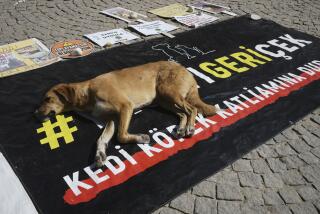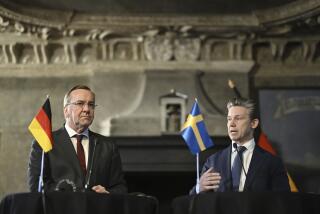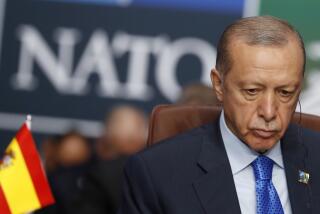Turkey Will Allow U.S. to Upgrade Ports, Bases
- Share via
ISTANBUL, Turkey — ISTANBUL, Turkey -- Turkey’s parliament Thursday took its first step to pave the way for the deployment of thousands of U.S. combat troops on Turkish soil in the event of war with Iraq.
In a stormy session that was closed to the public, lawmakers voted 308 to 193 to allow an unspecified number of U.S. army technicians to upgrade Turkish ports and air bases. The facilities would be used as launching pads for a second front against Iraqi forces in Kurdish-controlled northern Iraq.
A second ballot allowing the deployment of tens of thousands of U.S. troops in this predominantly Muslim nation is set to take place Feb. 18, when parliament reconvenes after the three-day Islamic holiday Eid al-Adha, or the Feast of the Sacrifice, which begins Tuesday.
Turkey’s action came as the North Atlantic Treaty Organization’s secretary-general set in motion efforts to begin military planning for the alliance to defend Turkey in case of a war in Iraq. At a tense meeting of NATO ambassadors in Brussels, Secretary-General George Robertson informed the 19 allies that military planning would begin Monday unless one of the holdout nations raised an objection.
During the last three weeks, France, Germany and Belgium have delayed efforts by NATO to help Turkey, a NATO member. The three countries argue that permitting any such preparations would amount to supporting war plans and would undermine U.N. arms inspections in Iraq at a sensitive moment.
Robertson turned up the heat by presenting his initiative as a “silence procedure” that gives him the power to order the planning unless there is any dissent by Monday morning. He wants NATO to provide Turkey with Patriot antimissile batteries, AWACS electronic surveillance planes, military units trained to deal with chemical and biological warfare, and troops to increase protection of military bases.
“This is a procedural and tactical shift” by Robertson, said a NATO diplomat who asked not to be identified. “It requires them to actually dissent.”
Speaking to reporters after the parliamentary vote, Recep Tayyip Erdogan, the leader of Turkey’s ruling Justice and Development Party, insisted that the move did not mean the country was entering a war.
“This is a precautionary decision. Our moral priority is peace ... but when it comes to our political priority, there lie Turkey’s interests and security,” he said.
Erdogan’s comments are a dramatic shift from his earlier antiwar rhetoric. Public opinion is squarely against U.S.-led military action against Iraq, with some polls showing nine out of 10 Turks opposed to war.
“We are being dragged into a war upon America’s orders,” said Mustafa Ozyurek, a lawmaker from the opposition Republican People’s Party, which voted against Thursday’s bill. “The consequences will be horrific.”
Many members of Erdogan’s faction, who like its leader began their political careers in an overtly Islamic party, are also deeply opposed to a war. Some 18 of them voted against the measure, while many others stayed away from the session.
Mindful of such opposition, Erdogan, who was swept into power Nov. 3, has been doggedly resisting pressure from the Bush administration to assume a role similar to the one Turkey played during the 1991 Persian Gulf War. In that conflict, Turkey opened its bases to coalition war planes that bombed Iraq.
Signs that Turkey’s stance was easing came as the government last month authorized U.S. military personnel to survey the bases and ports they will now be renovating. And last week, Turkey’s top policymaking body, the National Security Council, recommended that parliament approve the deployment of foreign troops.
“We believe that in line with our national interests, we should act together with our strategic ally, the United States,” said Turkish Prime Minister Abdullah Gul, briefing Turkish reporters before Thursday’s vote.
Several factors contributed to Turkey’s change of heart. Chief are fears of being cut out of U.S. military planning and out of shaping a postwar Iraq. An overarching priority expressed by Turkey’s powerful military leaders and politicians is ensuring that Iraq’s ethnic Kurds do not exploit the collapse of Iraqi President Saddam Hussein’s regime to establish an independent state in the north. Washington has gone a long way in allaying such fears by agreeing to allow Turkish troops to enter northern Iraq alongside U.S. forces in an eventual war.
“The Turkish soldiers will be in northern Iraq to take precautions, not to fight.... They will be there to prevent massacres, waves of refugees and the establishment of a [Kurdish] state,” Gul said in remarks published in the daily Milliyet.
Another worry addressed by the Bush administration is the likely impact of a war on Turkey’s troubled economy. Treasury Undersecretary for International Affairs John Taylor held talks today in Ankara, the capital, to finalize details of an economic package said to range between $4 billion and $15 billion.
*
Times staff writer Sebastian Rotella in Paris contributed to this report.
More to Read
Sign up for Essential California
The most important California stories and recommendations in your inbox every morning.
You may occasionally receive promotional content from the Los Angeles Times.













